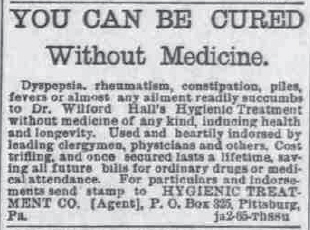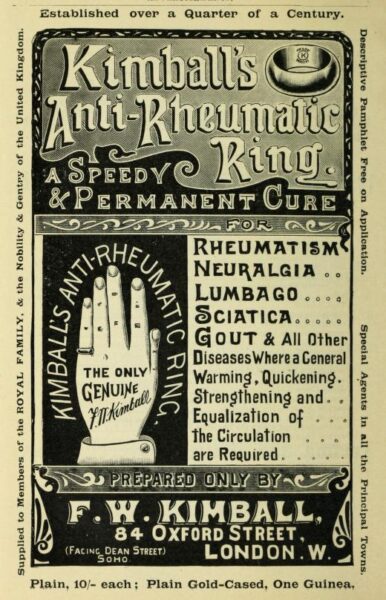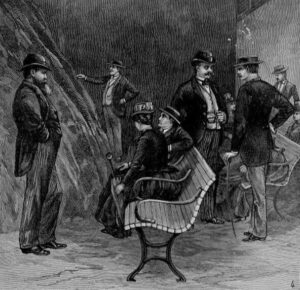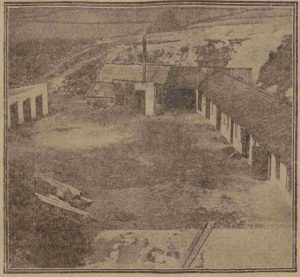From the Pittsburgh Dispatch, 2 Jan 1890
Alexander Wilford Hall wasn’t trying to flog a potion or contraption. His secret to health and longevity was something that people could do for themselves, for their whole lives, at very low cost. That is, if they really had the stomach for it.
On sending in a stamp, the enquirer would receive information about a booklet detailing the mysterious method. At a steep $4, this publication must really be something special, and according to a laudatory biography of Hall in Jay Henry Mowbray’s 1898 book Representative Men of New York, it sold 500,000 copies in the US, England and Australia. Purchasers were asked to agree to a ‘Pledge of Honor’ (or Honour, depending which country you were in) not to divulge the secret to anyone but their own family, although doctors were allowed to recommend it to patients.
The pamphlet reveals that the secret was a process that has enjoyed a resurgence in more recent times:
Disease depends upon the absorption of poisonous materials from the colon and rectum. Wash this out thoroughly with hot water once or twice a day and disease is robbed of its power, death of its terror and the doctor of his occupation. Use a large quantity of water, one or two gallons; retain it for as long as possible and that which is not absorbed can finally be expelled, taking with it accumulations which have a tendency to create diseases.
A sceptical correspondent to The Medical World, Dr Massie, colourfully paraphrased this as ‘Use lots of water (a gallon or two), retain it as long as possible, and then “Let her go, Gallagher!”’
Dr Massie also said:
I don’t know anything about Hall’s right to use the prefix ‘Dr.’, but suspect it is merely a trap to get some unwary M.D. to send for the June number of his alleged scientific journal, and be by it further deceived to send $4.00 for his alleged “Hygienic Method”
Massie needn’t have feared, however – Hall had a PhD from Lebanon Valley College, PA, and was Doctor of Laws from the University of Florida – therefore doubly entitled to be called ‘Doctor’. If people thought this meant he had a medical qualification, well, so be it!
After an inauspicious start as a mule-driver on the Erie Canal towpath, Hall worked hard to gain an education and became a writer and editor, producing his own journal, the Microcosm, and several works of philosophy. It was in the Microcosm that he announced the discovery of ‘this treatment for the cure of almost every known form of disease,’ and invited people to send $4 for the pamphlet. Although the secrecy and high cost aroused the suspicions of doctors like Massie, other physicians approved. Dr J H Etheridge of Chicago, for example, reported in rather graphic detail in the Medical Standard on his success with the treatment. In the case of one patient who had been a ‘poor breakfaster’ for years, ‘the discharges from her bowels were simply enormous’.
Etheridge might not have seen the Hygienic Treatment as quackery, but there was a danger of the method being promoted by amateur enthusiasts.
In 1889, 20-year-old George Harger, a student at the Rome Free Academy in New York, bought Hall’s pamphlet and was convinced it held the key to health. Whenever any of his fellow students were ill, he advised them to give up on conventional medicine and try the hygienic cure. His persistence, added to the fact that he was a staunch prohibitionist, didn’t do a lot for this young chap’s popularity. When he persuaded a seriously ill 16-year-old boy to adopt the hygienic treatment, enough was enough. The insufferable but unfortunate Harger was set upon by a mob of 15 other students and any remaining contents of his colon were promptly kicked out of him.
.
.





“and any remaining contents of his colon were promptly kicked out of him”…
Such a glorious use of the English language!
*curtseys*
😀
Nice story Caroline.
I hope that you are having a nice holiday, without hygienic treatments.
Have you come across Hunt’s Remedy? I have just discovered this wonderful advertisement:
http://unnaturalist.tumblr.com/post/1170683630
I just came across your post, I have an original bound copy of Dr. A. Wilford Hall’s hygenic treatment book dated 1889 in excellent condition. I found it in a box of my family’s heirlooms. It was a shocker to read through it!
Hall was a prolific inventor, with quite a few U.S. patents. He was the second inventior (after Edison) to patent a phonograph in the U.S.A. The working model of it is still owned by the Smithsonian. Other inventions included: the Wilford Hall Piano, at least one improved bicycle, a wash boiler, and a telephone diaphragm that could also be used with phonographs. Another periodical Hall edited and published was The Scientific Arena. Hall developed his “hygienic treatment” in the course of trreating himself for tuberculosis, as a young man. .Hall was deeply religious, and rather intolerant and feisty.One of his most famous books was Universalism Against Itself. But by early 1902, Hall was suffering from dementia and jumped off a ferry in the Hudson River. He was rescued, much to his dismay, saying: “I only wanted to die.” He did pass away that same year. I have never been able to find Hall’s exact date of death and if anyone out there knows it, please email me at robbiesmile@hotmail.com